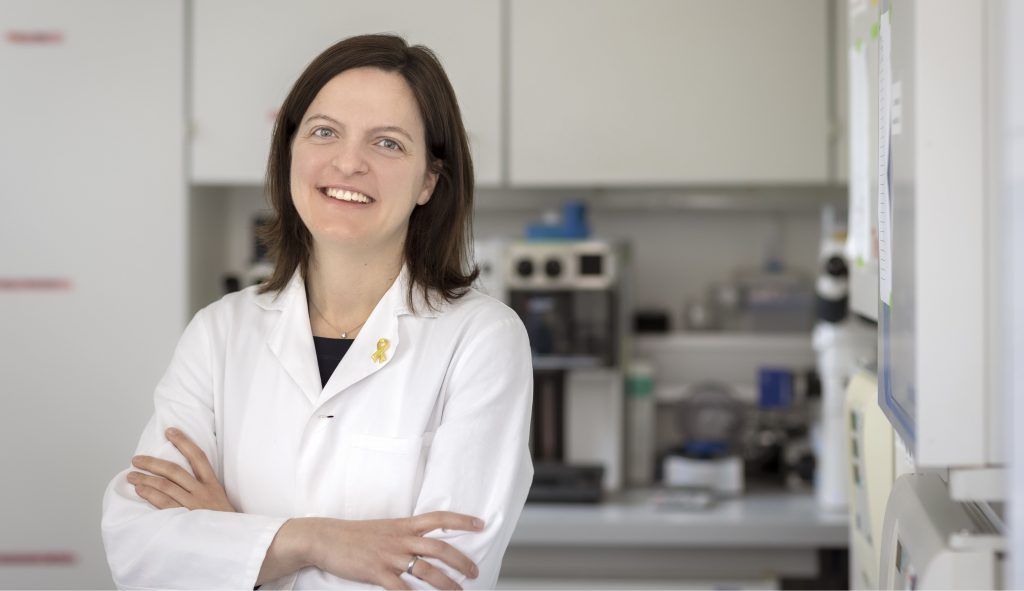
St. Anna CCRI earns WWTF grant to promote precision medicine in childhood cancer
(Vienna, 08.06.2021) St. Anna Children’s Cancer Research Institute is receiving a prestigious Life Science Grant for Precision Medicine, provided by the Vienna Science and Technology Fund (WWTF). Award winner Eleni Tomazou and her colleagues will clinically validate a promising new diagnostic approach, expected to enable precision medicine in childhood tumors based on blood samples.
Eleni Tomazou, PhD, a Principal Investigator at St. Anna Children’s Cancer Research Institute (St. Anna CCRI), is awarded one of the highly endowed Life Science Grants for Precision Medicine, which are issued by the Vienna Science and Technology Fund (WWTF). The selected project focuses on the clinical validation of a minimally invasive diagnostic toolkit for pediatric sarcomas. Out of 82 short applications, 24 projects were invited for a full proposal and seven projects were selected for funding with an overall amount of € 6.07 million. Dr. Tomazou, together with Prof. Christoph Bock, PhD, from CeMM Research Center for Molecular Medicine of the Austrian Academy of Sciences, Prof. Markus Metzler, MD, from the University Hospital Erlangen, and Prof. Uta Dirksen, MD, from the University Hospital Essen, will be able to devote a funding amount of almost € 900.000 to their research project on childhood tumors.
The project is based on the concept of liquid biopsies, where blood samples are collected and analyzed for short DNA fragments that a tumor has leaked into the blood stream. This approach provides a minimally invasive alternative to conventional tumor biopsies, holding great promise for precision medicine. However, clinical uptake in pediatric oncology has been slow compared to adult cancers, in part because low mutation rates in childhood cancer hamper the use of genetic markers for identifying tumor-derived DNA fragments.
“We have developed a liquid biopsy assay that is independent of genetic defects. It combines whole genome sequencing of cell-free DNA with machine learning algorithms to detect epigenetic and gene-regulatory patterns characteristic of tumor cells. Epigenetic patterns help to determine under which circumstances a gene is switched on and when it becomes mute”, explains Dr. Tomazou, who leads the Epigenome-based Precision Medicine research group at St. Anna CCRI. “In Ewing sarcoma, a bone cancer in children and young adults, we found widespread epigenetic aberrations. We exploit these alterations to improve diagnosis and monitoring of this disease, simply by analyzing fragmentation patterns of tumor derived DNA circulating in the blood”.
New diagnostic tool kit for pediatric bone cancer
A promising route toward better outcomes for patients with Ewing sarcoma is to personalize chemotherapy, such that each patient receives as much treatment as needed to maximize the chances of curing the cancer, while minimizing the long-lasting side effects that come with high-dose chemotherapy. “As the next step in our research, this funding allows us to clinically validate our liquid biopsy assay and thereby take a decisive step towards a more personalized treatment strategy for Ewing sarcoma”, says Dr. Tomazou.
The research team will pursue three applications of their minimally invasive diagnostic kit:
- Discrimination between patients with localized Ewing sarcoma with high versus low risk and detection of occult metastases at diagnosis
- Real-time monitoring of the initial response to chemotherapy
- Disease monitoring for early detection of relapse during continued chemotherapy and follow-up
Paving the way towards adaptive clinical trial design
“We are very excited. Our project will establish the foundations for innovative clinical trial design in pediatric cancers. Our liquid biopsy assay could be implemented for personalized adaptations of therapy, and for monitoring of patients to detect and interfere with relapses. Our approach complements other initiatives that focus on the genome or transcriptome. This has limitations in Ewing sarcoma and other childhood cancers, which we will address by looking at the characteristic epigenomes of these tumors”, says Dr. Tomazou.
Assoc.-Prof. Kaan Boztug, MD, Scientific Director of St. Anna CCRI comments: “This is a very promising project with high clinical relevance. The active participation of the German project partners as well as the close ties with the iEuroEwing consortium strengthens our international standing.”
Successful completion of the funded project will qualify epigenome-based liquid biopsy as molecular biomarkers for inclusion in prospective clinical trials.
Download the press release here: